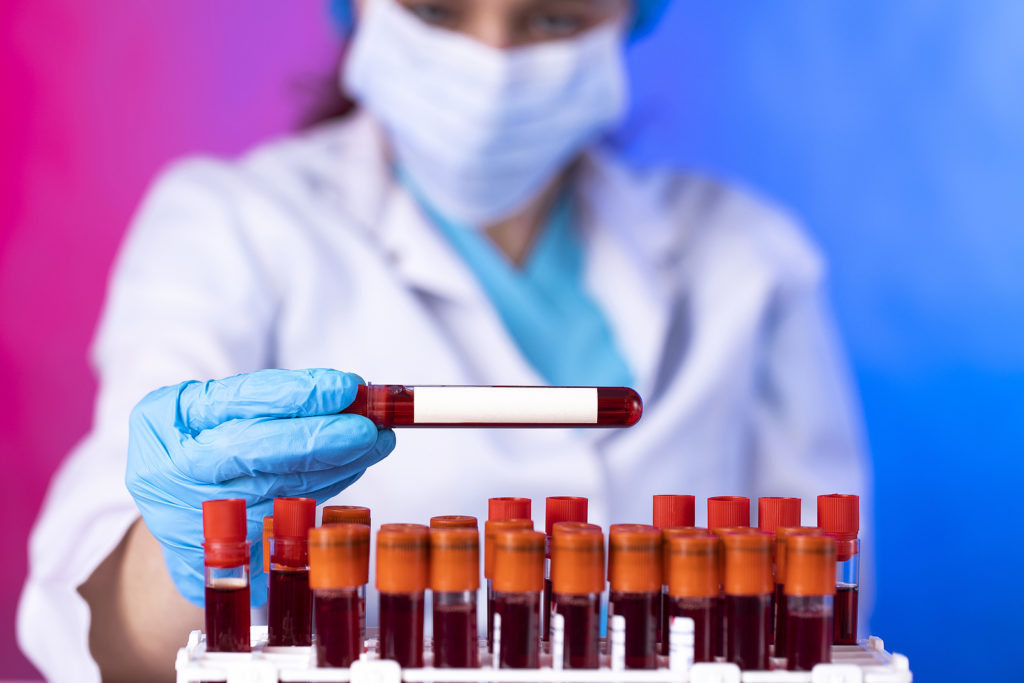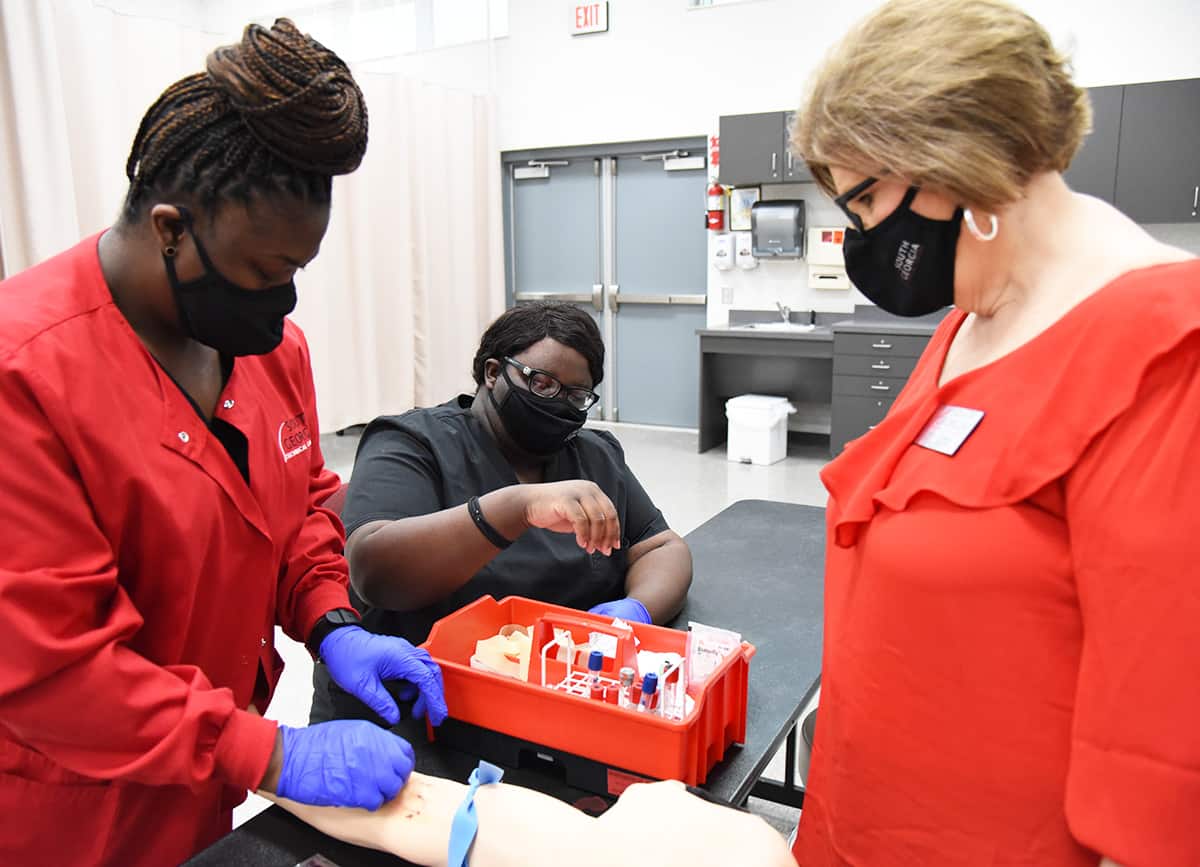How Phlebotomy Courses Near Me Can Fast-Track Your Entry into the Healthcare Field
How Phlebotomy Courses Near Me Can Fast-Track Your Entry into the Healthcare Field
Blog Article
The Course to Accreditation: Understanding the Phlebotomy Educating Program Trip and Its Relevance
As you consider the path to certification in phlebotomy, it is necessary to recognize the role you'll play in medical care. Your training will certainly cover essential skills, from blood collection techniques to patient interaction. Each component of the program prepares you for the challenges ahead. But exactly what does the trip involve, and why is qualification so vital for your future profession? Let's check out these questions better.

The Function of Phlebotomists in Medical Care
Phlebotomists play a crucial function in the healthcare system, serving as the crucial web link between patients and crucial analysis testing. You'll perform blood draws, guaranteeing samples are accumulated properly and safely. Your experience helps in detecting medical conditions, keeping track of wellness, and leading therapy decisions.
In your everyday interactions, you'll need to develop trust with individuals, making them feel comfy throughout what may be a difficult experience. You are accountable for labeling and handling samples thoroughly to stop contamination or errors, which can influence test outcomes.
Past this, you'll frequently function together with medical professionals and nurses, connecting critical details regarding individuals' conditions. By grasping your skills, you add meaningfully to individual treatment, making you a crucial component of the clinical team.
Review of Phlebotomy Training Programs
When exploring phlebotomy training programs, you'll discover numerous types made to fit various timetables and discovering styles. Each program aids you create essential abilities like blood collection and patient interaction. Comprehending these options is essential to selecting the appropriate course for your career.
Sorts Of Training Programs
A number of types of training programs are offered for those looking to become competent in phlebotomy. Additionally, some health centers and centers offer on-the-job training programs, offering functional experience while you find out. Whatever course you choose, each program aims to furnish you with the needed abilities for a successful phlebotomy job.

Secret Skills Developed
Mastering phlebotomy calls for a collection of crucial abilities that are created via extensive training programs. Furthermore, communication abilities are essential; you'll require to engage with individuals, describe treatments, and put them at convenience. Each of these skills is vital for your success as a licensed phlebotomist, making you a valuable asset in any healthcare setup.
Trick Elements of a Phlebotomy Program
In a phlebotomy course, you'll concentrate on essential subjects that prepared for your future profession. You'll participate in hands-on training that enables you to apply what you've found out in real-world settings. Both the core curriculum and useful experience are essential for your success as a phlebotomist.
Curriculum Overview
While going after a phlebotomy training program, you'll come across a curriculum developed to outfit you with essential abilities and understanding. Phlebotomy school. This educational program generally consists of makeup and physiology, concentrating on the blood circulation system and recognizing blood elements. You'll additionally find out about various kinds of blood collection methods, including venipuncture and capillary puncture strategies
Furthermore, infection control and safety and security procedures are crucial parts, guaranteeing you understand just how to preserve a sterilized environment. You'll examine patient communication, emphasizing interaction and compassion, which are critical for relieving client anxiousness.
Hands-On Training Experience
Getting hands-on experience is an essential part of your phlebotomy training program. This useful training permits you to apply what you've learned in a real-world setting, boosting your abilities and confidence. Phlebotomy Courses Near Me.
In addition, you'll get the possibility to engage with individuals, which is essential for creating your interaction skills. This combination of technical effectiveness and interpersonal skills is critical for your success as a licensed phlebotomist. Eventually, hands-on training is where theory fulfills practice, solidifying your understanding and preparedness for qualification.
Qualification and Licensing Demands
Before you can begin your profession in phlebotomy, it is important to comprehend the accreditation and licensing requirements that wikipedia reference differ by state. Many states require phlebotomists to hold a qualification from a recognized organization, such as the National Phlebotomy Association or the American Society for Scientific Pathology. These qualifications commonly include passing a test that checks your knowledge and skills in the area.
Along with certification, some states have certain licensing demands. You might need to finish a certain variety of hours in scientific practice, submit evidence of training, or undertake a history check. It is necessary to research your state's guidelines to make certain you satisfy all needed requirements.
Remaining educated concerning these needs not just aids you safeguard a placement but likewise improves your credibility as a professional. By satisfying these demands, you'll be well on your means to an effective job in phlebotomy.
Hands-On Training and Practical Experience
Hands-on training and sensible experience are necessary components of your phlebotomy education and learning, as they enable you to apply theoretical expertise in real-world circumstances. During your training, you'll engage in monitored venipuncture, discover proper strategies, and become accustomed to numerous blood collection devices. This direct participation is essential for building your self-confidence and developing your abilities.
You'll work very closely with skilled specialists who can lead you with the subtleties of patient communication and sample handling. Each technique session not only strengthens your understanding yet additionally prepares you for the busy setting of health care setups.
Furthermore, numerous programs include medical turnings, enabling you to experience varied setups, from health centers to outpatient centers. This exposure assists you adapt to different obstacles and patient demands, ensuring you're well-prepared for your future function. Welcome these possibilities, as they're vital to ending up being a proficient and thoughtful phlebotomist.
Obstacles Faced Throughout Training
While acquiring hands-on experience is vital, it's vital to recognize the obstacles that can occur throughout your phlebotomy training. In addition, grasping the abilities needed for blood draws takes method; you may battle with method initially.
Time monitoring can also be an obstacle, as harmonizing theory, useful sessions, and personal commitments can feel challenging. You may face differing discovering rates amongst your peers, bring about sensations of self-doubt if you assume you're dropping behind. Lastly, adjusting to the different characters of instructors can be difficult, as each might have an unique mentor style.
Acknowledging these challenges early can prepare you for success and help you create durability throughout your training trip.
Career Opportunities After Qualification

As you obtain experience, you could also consider concentrating on locations like pediatric or geriatric phlebotomy, dealing with certain patient needs. Some phlebotomists select to progress their professions browse around these guys by ending up being lab specialists or seeking further education and learning in medical care areas.
Additionally, your qualification can lead to roles in training or monitoring brand-new phlebotomists, allowing you to share your knowledge. With the medical care sector continuously expanding, your skills will certainly constantly remain in need, leading the way for a steady and fulfilling job. Welcome the possibilities awaiting you!
Often Asked Concerns
What Is the Typical Duration of a Phlebotomy Training Program?
Phlebotomy training courses typically last around four to eight weeks. You'll take part in hands-on technique, class direction, and on-line discovering. Finishing this training prepares you for certification and a satisfying profession in health care.
Are Online Phlebotomy Courses Available?
Yes, on-line phlebotomy programs are available. They use versatility and convenience, allowing you to examine at your very own speed. Just verify the program is recognized to satisfy qualification needs and gain important abilities for your career.
How Much Does Phlebotomy Training Typically Cost?
Phlebotomy training generally costs between her latest blog $700 and $2,500, depending upon the program and place. You should take into consideration variables like course length, consisted of products, and hands-on experience when selecting the ideal training for you.
What Are Typical Prerequisites for Phlebotomy Training?
Usual prerequisites for phlebotomy training frequently include a secondary school diploma or GED, immunizations, and a background check. Some programs might additionally require fundamental medical care knowledge or accreditations, ensuring you're prepared for hands-on training.
Can I Work While Finishing My Phlebotomy Training?
Yes, you can work while completing your phlebotomy training. Several trainees equilibrium tasks with their research studies, yet make specific to handle your time properly to guarantee you fulfill both job and training commitments successfully.
Report this page